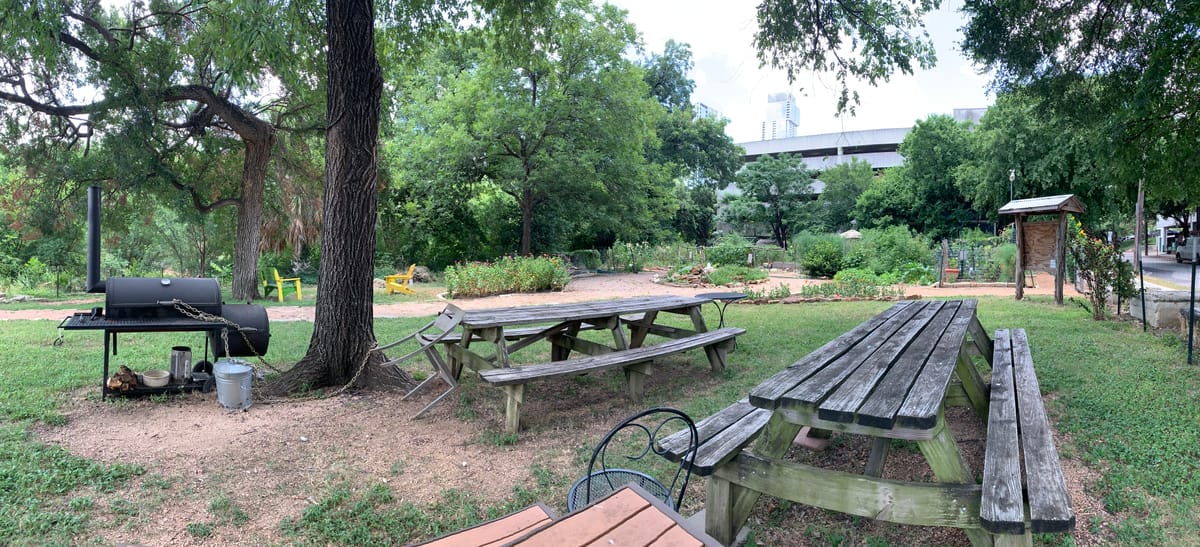Good Miscommunication
I think I was trying to embed an image, or hook up a .css file. No matter what I did, I couldn't get the thing to show up. I was stuck. Blocked. Hard. I fundamentally misunderstood something essential to the web.

This edition of the newsletter is a tad late. I've been neglectful of this habit, which I regret. Writing consistently is more difficult than I anticipated. But, here we are, showing up. I ate lunch at a neighborhood garden this week. It was wonderful, despite the increasing heat here in Austin, to sit alone and contemplate a volunteer gardener as they tended the beds. I want to join the next BBQ picnic.
Thanks for being here.
When I first started to play around with the web and dared to be paid for it, <a>, href=, source=, et al brought me to the point of tears. It was a summer internship, paid for with a $4k stipend to build a website for a non-profit.
I think I was trying to embed an image, or hook up a .css file. No matter what I did, I couldn't get the thing to show up. I was stuck. Blocked. Hard.
And I felt stupid. (Shame is a killer.)
I needed help from a friend who had walked the path before. Meaning, file-paths.
I was trying to deploy a website using Coldfusion (the thing Adobe bought). And I didn't understand the difference between relative and absolute file-paths. My code was broken. I felt broken.
I fundamentally misunderstood something essential to the web.
My friend1 and I were talking past each other for nearly an hour until it clicked in my brain. A humbling thought zapped my pride, "I don't understand filesystems."
Gulp. I’d been found out.
That moment was one of the more meaningful to my career for a couple reasons:
- Speaking a language does not mean you're communicating well
- Immersion invites people into miscommunication, which leads to true fluency, which unlocks good communication
This interaction freed something in me long hidden away. It was humbling, sure. But, it gave me permission to be wrong. In turn, I started learning with a hunger. There was this new realization that I have people, and they aren't trying to compete with me for resources, power, or prestige. There are people who want me to improve and want to help.
There was a moment when Sam and I were talking past each other. I wasn't understanding him, and I wasn't sure how to make myself understood (even though he understood perfectly well). We had to negotiate for each other's foundational concepts, the roots of understanding beneath the surface. He was unconsciously competent. I was painfully aware of how much I didn't know, I learned I was ignorant of the skill required to communicate with people who know things I needed to succeed. This skill is vulnerability, expressed as curiosity—an open mode, excitable.
This was a terrifying realization.
Many of my efforts at becoming fluent prior to this had been pretty gross and coercive in an attempt to preserve my ego and a desire to be seen as competent at something. I fought this until a truth slapped me in the face one day and wouldn't let me go.
"You are inherently valuable. Other people can see that when you believe it. If you hide or mask it, how will they know to believe what you're putting out there, this false thing you're communicating to them? They can never affirm the truths you withold.”
It takes a special person to call you out when you stop believing in your own inherent value. This person is your "interrupter". It puts the relationship at risk, a decisive moment where you have to choose to be exposed again for who you are and to choose to believe there lies something beautiful within, someone worth knowing.
In my interruption moment, my friend didn’t laugh at me like I'd expected. He patiently and gently taught me; celebrated with me when I grasped what was table stakes for his daily job.
It's funny how we miscommunicate in order to be reminded of certain, vital, things. Miscommunication is how we start to learn to be understood. It is how we test our own self-doubt, a piece of us hoping someone would see us and call us out. Out, into the sunshine.
This is how I started my journey into tech as a worker. Unlike tinkering, being paid requires working and seeking understanding with other people. And that, dear friends, is the work.
This year in particular has been instructive in one key way. I’ve had to face a tough thing (for me). Not everyone will reciprocate2 seeking to understand, no matter what you do. It is best to recognize this from your first interaction rather than to continually make yourself available without any boundaries established by explicit3 values.
Even this newsletter is an exercise at risking being misunderstood for the sake of building fluency. I need to know where I'm not communicating well, but I don't want to spend too many cycles on editing rounds and obsessing over how these words are received.
I crave the feedback inherent in sharing. How are these posts landing?
Here’s to getting to good sooner, over “being right”.
- Sam Sneau, thank you. ↩︎
- Get super clear on your boundaries early. You'll need them when interacting with someone convinced it's their job to fix you. Everything you say will be viewed through that lens. Instead, seek out people who want to understand you. If you can't tell the difference, I empathize, and want to write more. But that's another topic for another day. ↩︎
- I’m currently articulating this with a coach. It’s been good. I wasn’t willing to risk the rejection earlier in life that comes with being explicitly committed to being oneself. I wanted to be liked more than I wanted to love who I am becoming. That’s changing. ↩︎